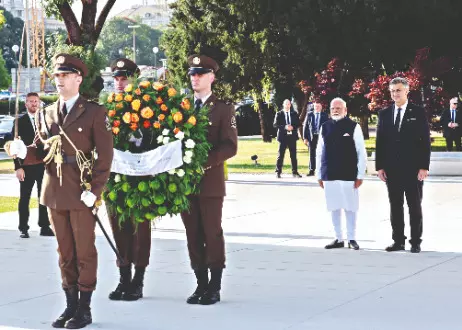Solutions to problems can’t come from battlefields: PM Modi in Croatia

Zagreb: Prime Minister Narendra Modi, on a historic visit to Croatia, held comprehensive talks with his counterpart Andrej Plenković on Wednesday, with both leaders reiterating that conflicts—whether in Europe or Asia—must be resolved through dialogue, not war. This statement comes amid ongoing tensions in West Asia, particularly between Israel and Iran.
“Be it Europe or Asia, we both believe that problems cannot be solved on the battlefield. Dialogue and diplomacy are the way forward,” Prime Minister Modi said in a joint media address after his meeting with Plenković.
The two leaders also condemned terrorism unequivocally, calling it a threat to humanity and democracy. Modi thanked Croatia for its continued support to India in fighting cross-border terrorism, adding that “respect for sovereignty and territorial integrity is essential in today’s world.”
Plenković, speaking alongside Modi, noted that the current international landscape is marked by instability and conflict. “We discussed the Russia-Ukraine war and the situation in West Asia. In such a global context, we believe that powerful nations must contribute to peace and uphold international law,” the Croatian leader stated. In a post on X, Modi described his discussions in Zagreb as “productive,” highlighting efforts to expand cooperation across a wide range of sectors. “Our talks covered defence and security, agriculture, IT, renewable energy, pharmaceuticals, and more,” he said. Modi is the first Indian Prime Minister to visit the Balkan nation. He was received at the airport by Plenković, a gesture described by Indian officials as reflective of the warmth between the two countries. The leaders also discussed ongoing efforts to finalize the India-European Union free trade agreement, with Plenković confirming Croatia’s backing for the deal. He also referred to the India-Middle East-Europe Economic Corridor (IMMEC) as a promising avenue for enhancing regional connectivity.
“We reviewed our economic ties and agreed to give momentum to bilateral trade,” Plenković said. “Croatia supports deeper strategic cooperation between India and the EU.”
Cultural relations formed another focal point of the visit. Four memoranda of cooperation were signed in areas such as agriculture, science, and culture. A separate agreement between the Indian Council for Cultural Relations (ICCR) and the University of Zagreb will strengthen academic collaboration, particularly in the study of Indology.
Modi announced that the Hindi Chair at Zagreb University has been extended until 2030 and a new cultural exchange programme will run for the next five years. “Indology has been popular in Croatia for many decades. Yoga is also gaining traction. These cultural bridges bring our nations closer,” he wrote on X.
Modi also met with Croatian President Zoran Milanović. According to Indian External Affairs Ministry spokesperson Randhir Jaiswal, the talks with the president “laid the foundation for a renewed partnership” rooted in democratic values and shared commitment to global peace.
During the visit, Prime Minister Modi paid homage at the Monument to the Homeland and was given a tour of Zagreb’s city centre by Plenković. “Grateful to my friend, Prime Minister Andrej Plenković, for showing me the culturally rich city of Zagreb,” Modi said in another post.
Plenković gifted Modi a reprint of the first printed Sanskrit grammar, authored by Croatian scholar Filip Vezdin in 1790, calling it a “symbol of early cultural connections between Croatia and India”. He also presented a book titled Croatia & India: Bilateral Navigator for Diplomats and Business, which he said reflects the progress and future potential of bilateral cooperation.
The visit marks the final stop of Modi’s three-nation tour, which also included visits to Russia and Canada.



